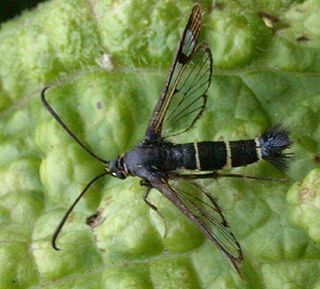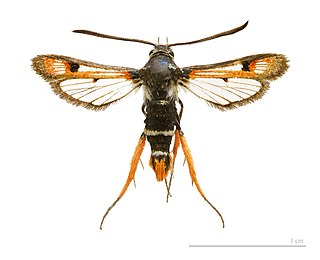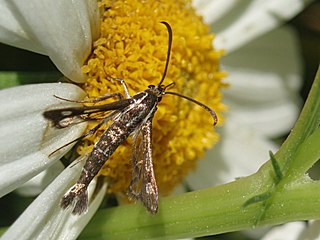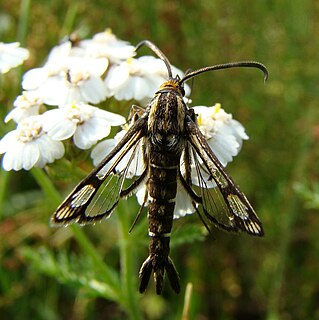| Bidentotinthia | |
|---|---|
| Scientific classification | |
| Kingdom: | Animalia |
| Phylum: | Arthropoda |
| Class: | Insecta |
| Order: | Lepidoptera |
| Family: | Sesiidae |
| Tribe: | Tinthiini |
| Genus: | Bidentotinthia Arita & Gorbunov, 2003 [1] |
| Species | |
See text | |
| Bidentotinthia | |
|---|---|
| Scientific classification | |
| Kingdom: | Animalia |
| Phylum: | Arthropoda |
| Class: | Insecta |
| Order: | Lepidoptera |
| Family: | Sesiidae |
| Tribe: | Tinthiini |
| Genus: | Bidentotinthia Arita & Gorbunov, 2003 [1] |
| Species | |
See text | |

The Sesiidae or clearwing moths are a diurnal moth family in the order Lepidoptera known for their Batesian mimicry in both appearance and behaviour of various Hymenoptera.

Sesioidea is the superfamily currently containing clearwing moths (Sesiidae), castniid moths (Castniidae) and little bear moths (Brachodidae). There is evidence from head and thoracic morphology that the first two families, internally feeding in plants as caterpillars, are sisters, whilst some brachodids are known to feed on leaf surfaces. Sesioidea are considered to be the sister group of Cossoidea which contain the also internal-feeding Goat and Leopard moths.

The hornet moth or hornet clearwing is a large moth native to Europe and the Middle East and has been introduced to North America. Its protective coloration is an example of Batesian mimicry, as its similarity to a hornet makes it unappealing to predators. The hornet moth has been linked to the large dieback of poplar trees across Europe because its larvae bore into the trunk of the tree before re-emerging as adults.

Synanthedon culiciformis, known as the large red-belted clearwing, is a moth of the family Sesiidae. It is found in the Palearctic and Nearctic realms.

Synanthedon tipuliformis, known as the currant clearwing, is a moth of the family Sesiidae. It is endemic to the Palearctic realm, but is an invasive species in the Nearctic realm and the Australasian realm.

Synanthedon vespiformis, the yellow-legged clearwing, is a moth of the family Sesiidae. It is found in the Palearctic ecozone.

Bembecia ichneumoniformis, the six-belted clearwing, is a moth of the family Sesiidae.

Synanthedon andrenaeformis, the orange-tailed clearwing, is a moth of the family Sesiidae. It is known from most of Europe. It is also present in the Near East.

Pyropteron muscaeforme, the thrift clearwing, is a moth of the family Sesiidae. It is known from most of Europe. A small member of its genus, the wingspan is 15–18 mm. It is further distinguished by narrow clear (transparent) spaces on the blackish, or bronzy, forewings. There are three whitish bands on the body, and traces of a whitish line along the middle of the back.
Microsphecia brosiformis is a moth of the family Sesiidae. It is found from the Balkan Peninsula to the Crimea, southern Russia (Sarepta), Asia Minor, the Caucasus, Iran, Turkmenistan and Afghanistan.

Synanthedon stomoxiformis is a moth of the family Sesiidae. It is found in most of Europe and the Middle East.

Bembecia scopigera, the six-belted clearwing or glearwing, is a moth of the family Sesiidae. It is found from central Spain over most of south-western and central Europe, the Balkans, Greece, southern Russia and Ukraine to Turkey.

Pyropteron triannuliformis is a moth of the family Sesiidae. It is found from most of Europe to the Near East and Central Asia.

Chamaesphecia masariformis is a moth of the family Sesiidae. It is found in south-eastern Europe, Turkey, northern Iran, the Middle East, the Caucasus, southern Russia, Uzbekistan and Tajikistan.
Chamaesphecia nigrifrons is a moth of the family Sesiidae. It is found in central and south-eastern France, Corsica, Luxembourg, South Belgium, south-western Germany, Austria, south-eastern Czech Republic, eastern Slovakia, Hungary, Croatia, Slovenia, former Yugoslavia, Serbia, southern Republic of Macedonia, Bosnia and Herzegovina, Bulgaria, northern Romania, northern Greece, southern Ukraine, Transcaucasia, north-western and southern Turkey and north-western Syria.
Paranthrene insolita is a moth of the family Sesiidae. It is found in large parts of Europe, Turkey, Iraq, the Levant and the Palestinian Territories.
Synanthedon conopiformis, Dale's oak clearwing, is a moth of the family Sesiidae. It is found in almost all of Europe, except the north.
Synanthedon mesiaeformis is a moth of the family Sesiidae. It is found in France, Spain, Lithuania, Poland, the Czech Republic, most of the Balkan Peninsula, Finland, Russia and Asia Minor. The species prefers solitary trees on meadows, in parks and along streams.

Synanthedon scoliaeformis, the Welsh clearwing, is a moth of the family Sesiidae. It is found from almost all of Europe, east through Russia to Japan.
Max Bartel was a German entomologist.
| This article relating to moth family Sesiidae is a stub. You can help Wikipedia by expanding it. |